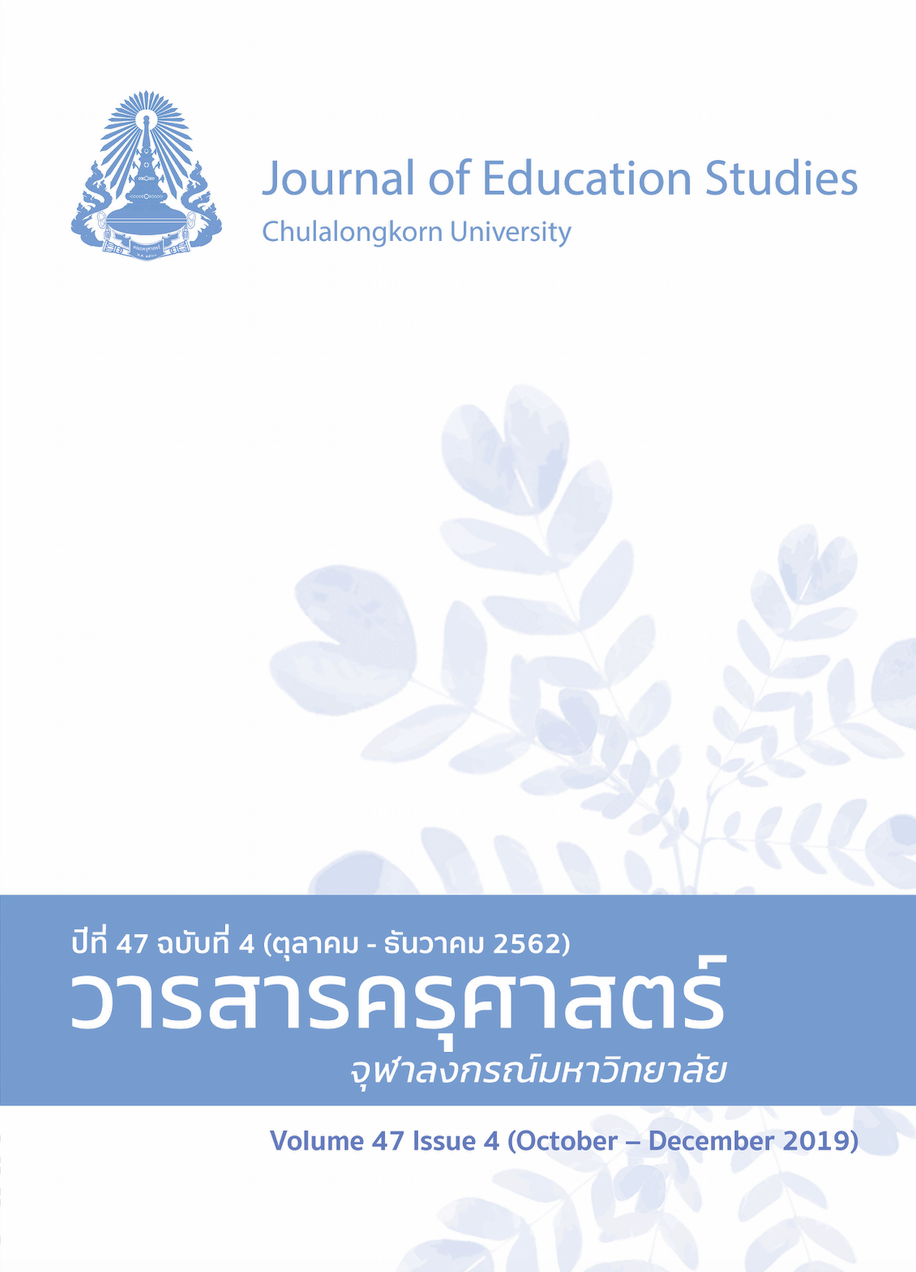A Comparison of Genetic Problem Solving Abilities among Examinees with Different Ability Levels in a Computer-Based Testing System with Immediate Feedback: An Application of the RISE Model
Keywords:
GENETIC PROBLEM SOLVING ABILITY, IMMEDIATE FEEDBACK, COMPUTER-BASED TESTINGAbstract
This research aims to 1) make a comparison of genetic problem solving abilities among examinees with different ability levels who receive different types of feedback, and 2) study the interaction of examinee ability levels and types of feedback with genetic problem solving ability. Examinees were 786 12th grade students in the first semester of the 2017 academic year (May 2017–September 2017) from 7 schools in the Bangkok educational service area, Thailand. The result showed that 1) the sample could be divided into three levels: the excellent group, which had the highest measured ability level (M = 6.80, SD = 1.054), the moderate group (M = 5.43, SD = 1.285), and poor group (M = 2.35, SD = 2.033), and 2) the examinees’ ability levels and types of feedback interact with examinees’ genetic problem solving abilities (F =5.891, Sig = 0.000). All 3 groups (excellent, moderate, and poor) exhibited higher genetic problem solving abilities when provided with the 5 types of feedback, at a statistical significance level of .05.
References
นนทกร อรุณพฤกษากุล. (2559). การเปรียบเทียบผลสัมฤทธิ์ทางการเรียนและความสามารถในการแก้ปัญหา ของนักเรียนระดับชั้นมัธยมศึกษาปีที่ 4 ที่ได้รับการจัดการเรียนรู้โดยใช้ปัญหาเป็นฐาน. การประชุมวิชาการระดับชาติครุศาสตร์ ครั้งที่ 1 การจัดการศึกษาเพื่อพัฒนาท้องถิ่น สู่ประชาคมอาเซียน: ทิศทางใหม่ในศตวรรษที่ 21 (น. 361-370). กาฬสินธุ์: ประเทศไทย.
ประกอบ กรณีกิจ และ จินตวีร์ มั่นสกุล คล้ายสังข์. (2556). รูปแบบอีเลิร์นนิงแบบผสมผสานโดยใช้บันทึกสะท้อนการเรียนรู้ แบบมีปฏิสัมพันธ์ออนไลน์ที่ส่งเสริมความใฝ่รู้และความคงทน ในการจำของนิสิตคณะครุศาสตร์ จุฬาลงกรณ์มหาวิทยาลัย. วารสารครุศาสตร์, 41(3), 66-82.
พรรณทิพา ศรีโชติ. (2556). ขับเคลื่อนประเทศไทย ก้าวสู่มิติใหม่การประเมินผลทางการศึกษา (Assessment). สืบค้นจาก https://www.facebook.com/notes/puntipa-srichot
สุชาฎา คล้ายมณี. (2558). ผลการให้ข้อมูลย้อนกลับต่อการปฏิบัติ กิจกรรม 5ส หอพัก ของนักศึกษาพยาบาลวิทยาลัยพยาบาลบรมราชชนนี นครราชสีมา. The Journal of Boromarajonani College of Nursing, 20(1), 67-68.
สรรเสริญ วีระพจนานันท์. (2557). การเพิ่มผลสัมฤทธิ์ทางการเรียน เรื่อง การแก้โจทย์ปัญหาพันธุศาสตร์ของเมนเดล วิชาชีววิทยา 5 ด้วยตารางพันเนตต์ของนักเรียนชั้นมัธยมศึกษาปีที่ 6/1 โรงเรียนแม่วงก์พิทยาคม. สืบค้นจาก www.sns.ac.th/vichakarn/word/114.doc.
ภาษาอังกฤษ
Attali, Y. (2011). Immediate feedback and opportunity to revise answers: Application of a graded response IRT model. Applied Psychological Measurement, 35(6), 472-479.
Attali, Y. (2015). Effects of multiple-try feedback and question type during mathematics problem solving on performance in similar problems. Computers and Education, 88, 260-267.
Eberlein, M. (2010). The effects of feedback on self-assessment. Bulletin of Economic Research, 63(2), 177-199.
Gouli, E., Gogoulou, A., & Grigoriadou, M. (2008). Supporting self-, peer-, and collaborative- assessment in e-learning: The case of the peer and collaborative assessment Environment (PECASSE). Journal of Interactive Learning Research, 19(4), 615-647.
Shute, V. J. (2008). Focus on formative feedback. Educational Testing Service, 78(1), 153-189.
Van der Kleij, F. M., Eggen, T. J. H. M., Timmers, C. F., & Veldkamp, B. P. (2012). Effects of feedback in a computer-based assessment for learning. Computers and Education, 58(1), 263-272.
Wray, E. (2013). RISE model. Retrieved from http://www.emilywray.com/rise-model
Yastibas, G. C., & Yastibas, A. E. (2015). The effect of peer feedback on writing anxiety in Turkish EFL (English as a foreign language) students. Procedia Social and Behavioral Sciences, 199(2015), 530-538.
Zhang, F., Zhang, X., Luo, M., & Geng, H. (2016). The effects of feedback on memory strategies of younger and older adults. PLOS ONE, 11(12), 1-18. doi:10.1371/journal. pone.0168896




